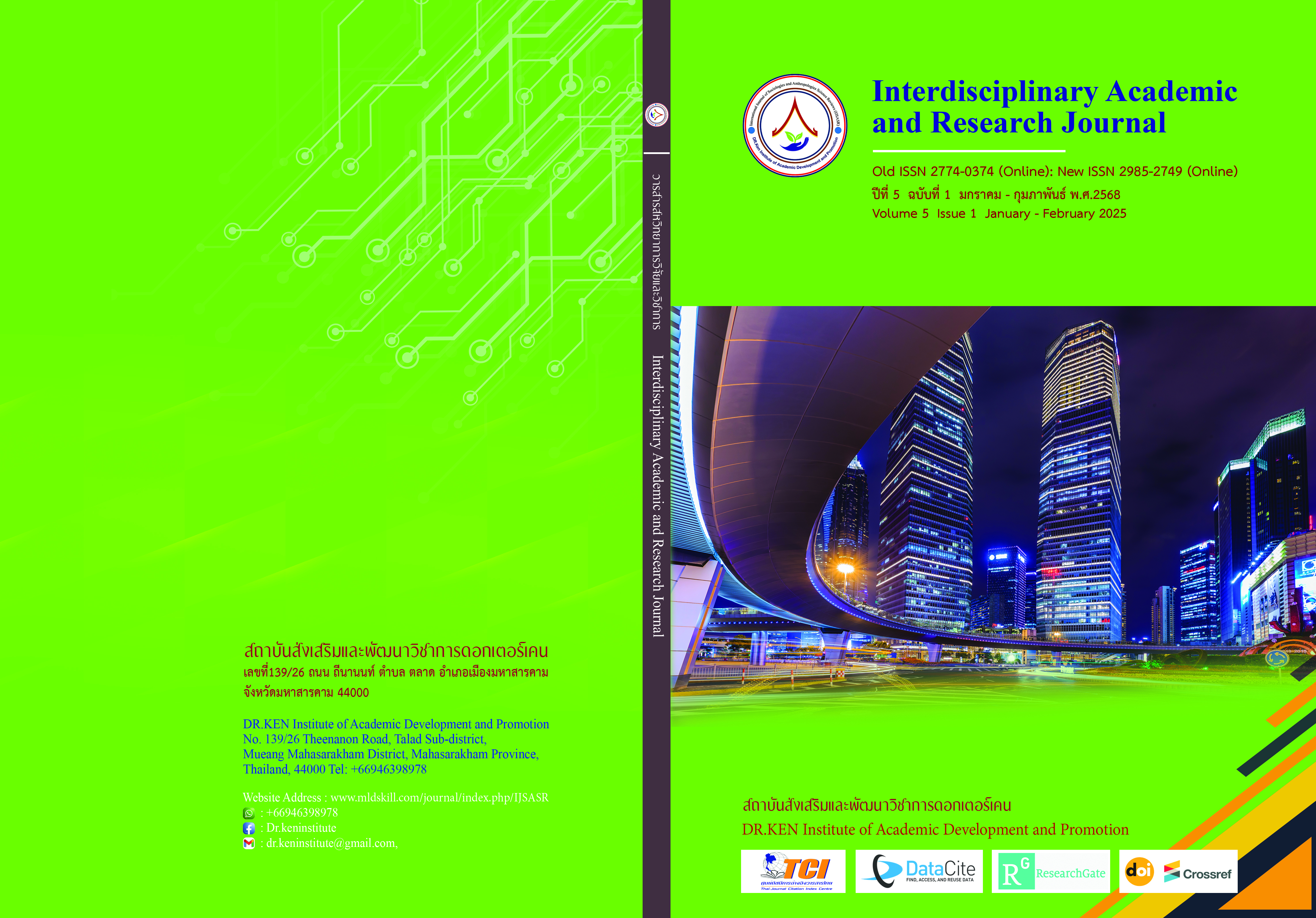Guidelines for Developing Historical and Cultural Tourism in Ang Thong Province for Thai Tourists
DOI:
https://doi.org/10.60027/iarj.2025.280213Keywords:
Historical and cultural tourism, Tourist behavior, Tourism developmentAbstract
Background and Aims: Historical and cultural tourism in Ang Thong province has high potential for local economic development, but lacks in-depth studies on tourists' behavior and decision-making factors. This research aimed to 1) study the behavior of historical and cultural tourists in Ang Thong province, 2) compare tourist attractions and environmental conditions affecting decisions to visit historical and cultural sites in Ang Thong province, 3) examine factors influencing decisions to engage in historical and cultural tourism in Ang Thong province, and 4) propose guidelines for developing historical and cultural tourism in Ang Thong province.
Methodology: A mixed-method approach was employed, combining quantitative research using questionnaires with 500 Thai tourists through systematic sampling (IOC = 0.67, reliability = 0.902) and qualitative research through in-depth interviews with 9 stakeholders. Data were analyzed using descriptive and inferential statistics, including t-test, ANOVA, and correlation analysis.
Results: The study found that 1) most tourists were family and friend groups, preferring one-day trips on weekends; 2) facilities and safety were the most crucial factors in tourism decision-making; 3) travel purposes and duration were secondary factors; 4) eight development guidelines were proposed, including infrastructure development, safety promotion, tourism activity development, public relations, local culture conservation, personnel development, cooperation integration, and budget management.
Conclusion: The proposed guidelines for developing historical and cultural tourism in Ang Thong province will help elevate tourism efficiency and sustainability, positively impacting long-term economic development and quality of life for local communities.
References
กรมการท่องเที่ยว. (2566ก). รายงานสถิตินักท่องเที่ยว ประจำปี 2565. กรุงเทพฯ: กระทรวงการท่องเที่ยวและกีฬา.
กรมการท่องเที่ยว. (2566ข). รายงานสถานการณ์ท่องเที่ยวภายในประเทศ รายจังหวัด ปี 2565. กรุงเทพฯ: กระทรวงการท่องเที่ยวและกีฬา.
กระทรวงการท่องเที่ยวและกีฬา. (2566). สรุปสถานการณ์นักท่องเที่ยวและรายได้จากการท่องเที่ยว ปี 2565. กรุงเทพฯ: กระทรวงการท่องเที่ยวและกีฬา.
การท่องเที่ยวแห่งประเทศไทย. (2564). รายงานสถานการณ์การท่องเที่ยวภายในประเทศ ปี 2564. กรุงเทพฯ: การท่องเที่ยวแห่งประเทศไทย.
จิราพร ทองอยู่. (2566). ปัจจัยที่มีอิทธิพลต่อการตัดสินใจท่องเที่ยวเชิงประวัติศาสตร์และวัฒนธรรมของนักท่องเที่ยวชาวไทยในจังหวัดขอนแก่น. วารสารวิชาการมนุษยศาสตร์และสังคมศาสตร์ มหาวิทยาลัยมหาสารคาม, 42(1), 1-15.
จุฑารัตน์ ศรีจันทร์. (2565). การวิเคราะห์ช่องทางการรับข้อมูลและการตัดสินใจของนักท่องเที่ยว. วารสารการท่องเที่ยวไทย, 17(2), 45-60.
ชิดชม กันจุฬา. (2563). ปัจจัยที่มีอิทธิพลต่อการตัดสินใจท่องเที่ยวเมืองรองของนักท่องเที่ยวชาวไทย กรณีศึกษาจังหวัดอ่างทอง. วารสารเพื่อการพัฒนาการท่องเที่ยวสู่ความยั่งยืน, 2(2), 64-80.
ณัฐวัฒน์ แก้วจันทร์. (2566). การจัดการแหล่งท่องเที่ยวและกิจกรรมทางวัฒนธรรมในภาคกลาง. วารสารการจัดการการท่องเที่ยว, 8(1), 78-95.
ธนภูมิ ปองเสงี่ยม และณัฐพล วงษ์ชื่น. (2565). แรงจูงใจและความสนใจของนักท่องเที่ยวในการเลือกแหล่งท่องเที่ยวเชิงประวัติศาสตร์และวัฒนธรรม. วารสารการท่องเที่ยวและการโรงแรม, 20(3), 112-130.
ธีราพร กาญจนวัตร. (2565). การศึกษาศักยภาพแหล่งท่องเที่ยวเชิงประวัติศาสตร์และวัฒนธรรมในจังหวัดอ่างทอง. วารสารวิชาการการท่องเที่ยวไทยนานาชาติ, 18(2), 45-60.
บริสุทธิ์ แสนคำ. (2564). พฤติกรรมการท่องเที่ยวของนักท่องเที่ยวชาวไทยในยุคโควิด-19. วารสารการท่องเที่ยวไทยนานาชาติ, 17(1), 1-15.
บุญชม ศรีสะอาด. (2556). การวิจัยเบื้องต้น (พิมพ์ครั้งที่ 9). กรุงเทพฯ: สุวีริยาสาส์น.
ประพันธ์พงษ์ ชิณพงษ์, สุนทร บุญแก้ว และธนาวุฒิ นิลมณี. (2566). พฤติกรรมการเดินทางและการเข้าถึงแหล่งท่องเที่ยวของนักท่องเที่ยวชาวไทย. วารสารวิชาการการท่องเที่ยวไทยนานาชาติ, 19(1), 25-42.
เลิศศักดิ์ ประเสริฐสุข. (2565). บทบาทของการท่องเที่ยวในการส่งเสริมสันติภาพและความเข้าใจระหว่างวัฒนธรรม. วารสารสังคมศาสตร์, 24(1), 78-95.
วรรณา ศิลปอาชา, ระชานนท์ ทวีผล และสุธาทิพย์ เข็มน้อย. (2564). ปัจจัยที่ส่งผลต่อความสำเร็จของการท่องเที่ยวเชิงประวัติศาสตร์และวัฒนธรรม. วารสารการท่องเที่ยวไทยนานาชาติ, 17(2), 45-62.
สุดถนอม ตันเจริญ. (2564). การจัดการการท่องเที่ยวเชิงวัฒนธรรมอย่างยั่งยืน. กรุงเทพฯ: สำนักพิมพ์แห่งจุฬาลงกรณ์มหาวิทยาลัย
สุธาทิพย์ เข็มน้อย, วรรณา ศิลปอาชา และระชานนท์ ทวีผล. (2565). การพัฒนาการท่องเที่ยวอย่างยั่งยืนในแหล่งท่องเที่ยวทางประวัติศาสตร์และวัฒนธรรม. วารสารการจัดการสิ่งแวดล้อม, 18(2), 56-75.
อรัญญา จิระประภากุล. (2565). แนวโน้มการท่องเที่ยวเชิงวัฒนธรรมในประเทศไทย. วารสารการจัดการการท่องเที่ยว, 12(3), 112-130.
Buckley, R. (2012). Sustainable tourism: Research and reality. Annals of Tourism Research, 39(2), 528-546.
Butler, R. W. (1980). The concept of a tourist area cycle of evolution: Implications for management of resources. Canadian Geographer, 24(1), 5-12.
Cohen, E. (1972). Toward a sociology of international tourism. Social Research, 39(1), 164-182.
Creswell, J. W., & Plano Clark, V. L. (2018). Designing and conducting mixed methods research (3rd ed.). Sage publications.
Filieri, R., Acikgoz, F., Ndou, V., & Dwivedi, Y. (2021). Is Trip-Advisor still relevant? The influence of review credibility, review usefulness, and ease of use on consumers' continuance intention. International Journal of Contemporary Hospitality Management, 33(1), 199-223.
Gretzel, U., Sigala, M., Xiang, Z., & Koo, C. (2015). Smart tourism: foundations and developments. Electronic Markets, 25(3), 179-188.
Hinkle, D. E., Wiersma, W., & Jurs, S. G. (2003). Applied statistics for the behavioral sciences (5th ed.). Boston: Houghton Mifflin.
Hsieh, H. F., & Shannon, S. E. (2005). Three approaches to qualitative content analysis. Qualitative Health Research, 15(9), 1277-1288.
Kotler, P., & Keller, K. L. (2016). Marketing management (15th ed.). Pearson.
Okazaki, E. (2008). A community-based tourism model: Its conception and use. Journal of Sustainable Tourism, 16(5), 511-529.
Patton, M. Q. (2015). Qualitative research & evaluation methods: Integrating theory and practice (4th ed.). Sage publications.
Pearce, P. L. (2005). Tourist behaviour: Themes and conceptual schemes. Channel View Publications.
Pine, B. J., & Gilmore, J. H. (1998). Welcome to the experience economy. Harvard Business Review, 76, 97-105.
Sigala, M. (2020). Tourism and COVID-19: Impacts and implications for advancing and resetting industry and research. Journal of Business Research, 117, 312-321.
Timothy, D. J., & Boyd, S. W. (2006). Heritage tourism in the 21st century: Valued traditions and new perspectives. Journal of Heritage Tourism, 1(1), 1-16.
Varkaris, E., & Neuhofer, B. (2017). The influence of social media on the consumers' hotel decision journey. Journal of Hospitality and Tourism Technology, 8(1), 101-118.
Zemla, M., & Siwek, T. (2021). The impact of the COVID-19 pandemic on the development of selected trends in tourism consumption. Sustainability, 13(13), 7246.
Downloads
Published
How to Cite
Issue
Section
License
Copyright (c) 2025 Interdisciplinary Academic and Research Journal

This work is licensed under a Creative Commons Attribution-NonCommercial-NoDerivatives 4.0 International License.
Copyright on any article in the Interdisciplinary Academic and Research Journal is retained by the author(s) under the under the Creative Commons Attribution-NonCommercial-NoDerivatives 4.0 International License. Permission to use text, content, images, etc. of publication. Any user to read, download, copy, distribute, print, search, or link to the full texts of articles, crawl them for indexing, pass them as data to software, or use them for any other lawful purpose. But do not use it for commercial use or with the intent to benefit any business.
















.png)


